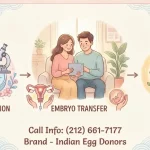It’s a sacrificial and life-changing move to become an egg donor. To proceed with the egg donation cycle, however, you need to know every step of the way—precisely the genetic screening process. This absolutely integral component of your donor process not only ensures the recipients are protected but also ensures the wellness of the child in the future is protected. In this blog, we’ll break down what genetic screening is, why it matters, what to expect, and how it fits into the broader egg donation cycle.
For anyone asking, “What is an It’s donation cycle?”: it’s a structured process that includes screening, medication, egg retrieval, and recovery. Genetic screening happens early in this cycle.
What Is an Egg Donation Cycle?
A cycle of egg donation is the whole process a donor undertakes, from consultation and screening to eventual egg collection. It typically involves medical checks, psychological assessment, legal advice, and fertility treatment. The first and most significant step, arguably, is genetic screening.
This is done to make sure that the donor is in good health, the eggs are healthy, and the recipient has the best chance of success. All the steps are timed and coordinated beautifully by an infertility specialist.
See how EggDonors4All takes donors step by step through the process.
What Is Genetic Screening?
It is a medical examination that detects changes in your DNA, which could predispose you to genetic diseases. The objective of this screening is to make sure you are not a carrier for any genetic diseases that would be passed on to a child conceived through the use of an egg donor.
Screening is a quick blood or saliva test. The report informs fertility experts and genetic counselors if there are risks for applying your eggs.
Why Is Genetic Screening Important?
- Recipient Safety: The foremost concern is ensuring the recipient is not spreading any major genetic illnesses from the donor.
- Future Child’s Health: Having this information is necessary for avoiding future medical problems in the child conceived through donation.
- Donor Awareness: Genetic screening can reveal conditions the donor wouldn’t otherwise be aware of, giving information on personal health and family planning.
- Legal and Ethical Standards: Legitimate clinics such as EggDonors4All adhere to stringent medical and ethical guidelines, including extensive genetic screening of every donor.
What Does the Genetic Screening Test For?
Most genetic screens test for more than 100 conditions. Some of the most common are:
- Cystic Fibrosis
- Tay-Sachs Disease
- Sickle Cell Anemia
- Fragile X Syndrome
- Spinal Muscular Atrophy
You can also be screened for disorders on the basis of ethnicity, because certain genetic disorders are more common in certain groups.
How Genetic Screening Fits Into the Egg Donation Cycle
This is where genetic screening enters the bigger egg donation cycle:
- Application & Pre-Screening: Donors undergo initial interviews and medical check-ups after submitting an application.
- Genetic Counseling: Before testing, you’ll meet with a genetic counselor who will explain the screening process, possible outcomes, and what certain results could mean.
- Testing Phase: The test is usually done via a simple blood draw or saliva sample. Results can take a few weeks.
- Results Review: A genetic counselor will review your results with you. If you are determined to be a carrier of any condition, further action may be required, for example, matching you to a recipient who is not a carrier of the same condition.
- Approval for Donation: Provided all is well, you will be approved to continue with the remainder of your egg donation cycle.
What If You Are a Carrier?
Carrying does not automatically exclude you. Some individuals carry disease genes without the disease. If you are a genetic disease carrier:
- The clinic can pair you with a non-carrier recipient for the same condition.
- You might require further genetic counseling.
- You can donate based on the risk profile.
Ethical Considerations
Genetic screening is also employed to reduce ethical issues. The donors need to be informed of their own genetic results, and the intended parents should be informed of the genetic risk. Open procedures generate trust among donors, recipients, and the fertility clinic.
EggDonors4All adheres to all the national and international standards for genetic testing and keeps both the donors and the recipients well-informed about everything.
Emotional Impact of Genetic Screening
Learning that you are a carrier of a genetic disorder can be a shock or upsetting. Counselling is therefore a necessary component of egg donation. Counselling services are usually offered by clinics to assist you in accepting the information and making informed decisions.
EggDonors4All staff make sure that all egg donors receive good care during the process.
Your Role in a Successful Egg Donation Cycle
By being genetically tested, you’re doing the right thing by making your donation as fertile and healthy as possible. It’s all part of the process, just like hormone treatments, visits, and actually undergoing the egg retrieval process.
Don’t forget, the egg donation cycle is a collaborative process—you’re never on your own. Your medical team, counselors, and clinic coordinators are there to guide you throughout the entire process.
FAQs About Genetic Screening and the Egg Donation Cycle
Q. How long does it take to get genetic screening results?
Ans : Generally 2 to 3 weeks.
Q. Will insurance cover the cost of testing?
Ans : In most donation programs, such as EggDonors4All, the agency or recipient pays for all medical expenses.
Q. Is genetic screening required for all egg donors?
Ans : Reputable clinics demand it as a standard feature of the egg donation package.
Q. Can I access my results later?
Ans : Most of the clinics will give you a copy of your results to keep for your own records.
Q. What happens if my results show a risk?
Ans : You will meet with a counselor to discuss the results. You might still be eligible if there is a recipient match.
Final Thoughts
Genetic testing is a very early component of the egg donation cycle, one that is intended to safeguard all three parties—the donor, the recipient, and the resulting child. If you’ve ever been curious about what an egg donation cycle is, now you know that genetic testing is one of its building blocks.

Dr. Veera Saghar
As an Egg Donor Coordinator, she plays a critical role in our company. Her background as a medical graduate from ISRA UNIVERSITY in Pakistan provides us with a solid foundation in the medical sciences. She has seven years of clinical experience practicing in the USA. This has given her firsthand experience when collaborating with patients and their families.
She is responsible for managing the process of egg donation from start to finish. We identify and screen potential egg donors.










